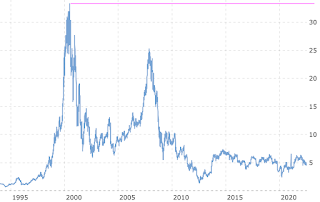What Are the Consequences of Overpaying for Stocks?
If you follow Facebook groups and listen to podcasts about trading it seems that a lot of people today, choose a company that they like or identify with and that’s all the parameters that qualify them buying a stock. Or they buy a stock they believe will be trendy in the future and they buy the stock immediately without understanding the company or the value of the business. They pay the stock price and sit back and wait for it with the expectation that it will go up.
This is trading using the “Efficient-market hypothesis” that these people invest by because it's used in academia and a style often shared in media. The Efficient-market hypothesis won a Nobel prize and very loosely defined by stocks are always correctly priced because investors have all the available information needed. But is that true – do you believe that people today have all available info when they invest in a stock? The info might be out there but it seems that many people on social media ask the crowd instead of reading the company's annual report.
And despite what the Efficient-market hypothesis is saying, the price of the stock is not equal to the actual value of the company if we had to buy 100% of that company. The price is based on demand from traders. If you wanted to buy a coffee shop the price would fluctuate every minute like the stock price does.
“Price is what you pay. Value is what you get.”
Warren Buffett
Back when I got into trading stocks I would choose a company that I knew nothing about but I had only heard about, and my “strategy” was to predict that the industry would be trendy in the future. I wasn’t aware that the stock price didn’t match the company’s value. I just didn’t know better. I would try to predict: “More people would need that type of diabetes medicine” or “green energy is the way forward”. I didn’t experience a loss doing it this way – it was pure luck that I didn’t lose money.
When I was introduced to Buffett’s investing principles there was no going back. His principles made sense to me and I’ve never looked back. As you know if you’ve followed me for a while, I learned from Warren Buffett that it’s not about predicting trends but it’s about minimizing risk and not losing your hard-earned money.
I’m not fearful to share my mistakes here because I see this from other’s all the time and I want to help other people that are putting their money in the stock market to get educated. If you have a friend that needs to read this article, please share it with them.
I thought it would be fun to look at what can happen if we aren’t mindful about the value of the company and overpay for a stock. Below are 3 graphs with stock prices from different companies
Nokia 2000-2022
Amazon 1999-2009
In this graph you see the price of Amazon stock from around 1999-2009. Another company that was impacted by the dot-com-bubble was Amazon. Did you know that after 1999 it took Amazon 10 years to recover from the peak? The stock did eventually come back, and Jeff Bezos has built a solid business. Today the stock price is overvalued compared to the company’s actual value, so though it might be a great business, and though the stock price has fallen recently it is still overpriced.
First Solar 2008-2022
Solar power is popular because it's green energy and First Solar was a super popular stock back in 2008. However, if you would’ve jumped on this trend back then you’d still be waiting for a positive return. I chose this example because investing in a trend doesn’t necessarily mean that the stock will go up or that the company is being run with capable management just because it’s green energy and trendy. Some of you might think: Would this be an opportunity to get a green energy company at a reasonable price? No, even though the stock is trading lower than its peak in May 2008, it’s still overpriced, and you’d be paying more for the stock than the company is worth. Further, always do your due diligence and check if it’s truly a wonderful business. You can download my free checklist to get started.
Conclusion
Since you’re still reading along, I know that you get this and understand the implications of overpaying for stocks. It's important to get educated and to know what you’re investing in to not lose money during a stock market bubble. If you overpay for stocks – even in quality businesses - you could end up losing money or waiting many years to get a return.
There are still plenty of businesses out there that have never recovered from past peaks and there are companies that took more than a decade to recover. Therefore, it’s so incredibly important to know what you’re investing in and knowing the intrinsic value of the business and buying at a margin of safety. Students in my investing workshop learn how to invest so they don’t overpay. They get tools that are easy to use to calculate the value of a company as well as finding a company’s margin of safety price, so you can find the exact stock price that you should buy a stock for. This way you don’t pay 200 or more for something that’s worth 100.








Comments
Post a Comment